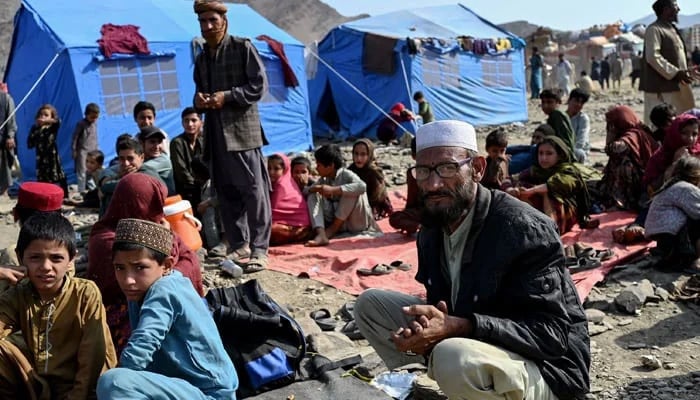Civil society again calls for stopping deportation of Afghans
More than 200,000 Afghan refugees have been deported by Pakistan’s caretaker government over the past 40 days, while the fate of another 3.8 million Afghans residing in Pakistan hangs in the balance, as does that of millions of Pakistani citizens, especially Pashtuns.
This was said by activists associated with the Joint Action Committee for Refugees — a collective platform of lawyers, rights activists, academics and professionals — while addressing a press conference at the Karachi Press Club on Saturday.
They claimed that contrary to the state’s narrative, the policy of expelling illegal immigrants is proving to be a mere facade for waging a radicalised and class-based war against those it deems inferior.
They also claimed that undocumented working-class Afghans, with well-founded fears of persecution, continue to be scapegoats for the interim government’s own ineptitude, affording the state the power to banish documented refugees and Pakistani citizens as well, without even attracting the due scrutiny from those responsible for upholding human rights.
They said that more abhorrently, the courts of Pakistan are also busy making a mockery of justice.
This was observed on Friday, they added, when the Supreme Court returned a petition for being not maintainable on the grounds of human rights or even being of constitutional importance.
This petition had been filed by human rights activists in support of ensuring the fulfilment of human rights for Afghan refugees, and against the flagrant disregard of the constitution by the caretaker government, they explained.
They lamented that children’s detention, pregnant women’s health risks at detention centres and on their return to the country they were seeking refuge from to begin with, and entire families being torn apart are apparently not maintainable for the SC under the fight for human rights.
They pointed out that on Wednesday a similar petition had been filed with the Sindh High Court (SHC) that they claimed was met with hostility and prejudice. During the hearing that lasted less than five minutes, the SHC said that the petition challenging state policy was not maintainable, they lamented.
“Our counsel pointed out that policies violating the constitution are subject to judicial review, and the present policy has been adopted by a caretaker government without the mandate to make such a decision,” said one of the activists.
“The bench did not entertain this. The bench then gave us three weeks to prove the maintainability of the petition, although our counsel said she was ready to prove it right there and then, yet this was denied.”
They said the SHC bench then quoted an example of Saudi Arabia’s treatment towards illegal immigrants, to which the activists’ counsel pointed out that the Pakistani constitution did not apply to Saudi Arabia and vice versa.
Even so, reducing millions of refugees who have fled persecution down to mere immigrants who have overstayed their visas reeks of a lack of sympathy towards the survivors of a long-drawn-out imperialist war that Pakistan has abetted, the activists claimed.
They said that instead of reprimanding those who have an illegal status in the country, why the blame is not being redirected to where it is due: on the state that keeps refugees’ status illegal in the first place by not issuing them proof of registration or Afghan citizen cards, as required under the agreement with the UNHCR.
They asked why the state does not develop a robust refugee policy, instead of a caretaker government unilaterally taking decisions with no democratic backing. They claimed that Pakistan played its part in destabilising Afghanistan, because of which Afghans had no choice but to flee to neighbouring countries, becoming refugees.
They lamented that to send them back to a place they had run away from due to legitimate fears of persecution — and death in the case of women, artists and religious minorities — is evil and barbaric.
Many Afghans have been living in Pakistan for decades, they said, adding that many of them have been born here, so for them this is the only home they know, and their only chance of survival.
They claimed that their involvement in providing some degree of relief to such people through their consistent visits to the detention centres in Sultanabad and Sohrab Goth over the last several days has strengthened their belief that the state is committing criminal negligence abetted by various institutions.
They demanded immediately stopping the detention and deportation process that is based on a decision by an interim government that does not even have the mandate to make such sweeping decisions, and whose own tenure has constitutionally expired.
Like all human beings, they pointed out, Afghan refugees also deserve the right to life, liberty and property, and any attempts by those in power to squash them would only weaken Pakistan’s international position, along with further disillusioning the people of Pakistan.
-
 Jelly Roll Reveals How Weight Loss Changed Him As A Dad: 'Whole Different Human'
Jelly Roll Reveals How Weight Loss Changed Him As A Dad: 'Whole Different Human' -
 Prince Harry Gets Emotional During Trial: Here's Why
Prince Harry Gets Emotional During Trial: Here's Why -
 Queen Camilla Supports Charity's Work On Cancer With Latest Visit
Queen Camilla Supports Charity's Work On Cancer With Latest Visit -
 Dove Cameron Opens Up About Her Latest Gig Alongside Avan Jogia
Dove Cameron Opens Up About Her Latest Gig Alongside Avan Jogia -
 Petition Against Blake Lively PGA Letter Gains Traction After Texts With Taylor Swift Revealed
Petition Against Blake Lively PGA Letter Gains Traction After Texts With Taylor Swift Revealed -
 Netflix Revises Warner Bros. Deal To $83 Billion: All-cash Offer
Netflix Revises Warner Bros. Deal To $83 Billion: All-cash Offer -
 Prince Harry Mentions Ex-girlfriend Chelsy Davy In UK Court
Prince Harry Mentions Ex-girlfriend Chelsy Davy In UK Court -
 David, Victoria Beckham 'quietly' Consulting Advisers After Brooklyn Remarks: 'Weighing Every Move'
David, Victoria Beckham 'quietly' Consulting Advisers After Brooklyn Remarks: 'Weighing Every Move' -
 Meta's New AI Team Delivered First Key Models
Meta's New AI Team Delivered First Key Models -
 Prince Harry Defends Friends In London Court
Prince Harry Defends Friends In London Court -
 AI May Replace Researchers Before Engineers Or Sales
AI May Replace Researchers Before Engineers Or Sales -
 Christina Haack Goes On Romantic Getaway: See With Whom
Christina Haack Goes On Romantic Getaway: See With Whom -
 Consumers Spend More On AI And Utility Apps Than Mobile Games: Report
Consumers Spend More On AI And Utility Apps Than Mobile Games: Report -
 Aircraft Tragedy: Missing Tourist Helicopter Found Near Japan Volcano Crater
Aircraft Tragedy: Missing Tourist Helicopter Found Near Japan Volcano Crater -
 Taylor Swift Lands In Trouble After Blake Lively Texts Unsealed
Taylor Swift Lands In Trouble After Blake Lively Texts Unsealed -
 'Prince Harry Sees A Lot Of Himself In Brooklyn Beckham'
'Prince Harry Sees A Lot Of Himself In Brooklyn Beckham'




